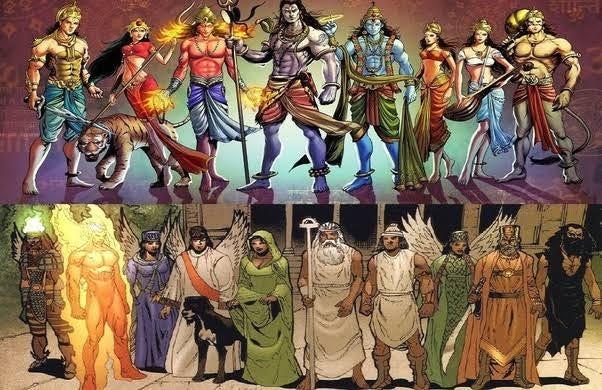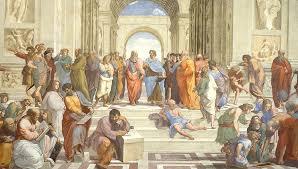- This topic has 0 replies, 1 voice, and was last updated by .
-
AuthorPosts
-
April 7, 2024 at 10:32 am #2006Up::0
In the wide range of human thinking and philosophy, ideas from different places and cultures often mix. In this mix of civilizations, there’s an interesting connection: Hinduism has strongly affected Greek philosophy.
In the records of history, evidence flourishes of a vibrant exchange between the Hindus and the Greeks, illuminating a shared journey of exploration and spiritual contemplation. At the heart of this exchange lies a union of ideas, manifesting in fascinating parallels and thoughtful insights.

The Heliodorus pillar stands as a silent lookout to this ancient interaction, created by a Greek ambassador named Heliodorus around 110 BCE. Topped by a sculpture of Garuda, it is dedicated to the Hindu deity Vasudeva, offering a physical witness to the fusion of Greek and Hindu religious motives.
Further evidence emerges in the writings of Megasthenes, where Krishna is equated with the Greek demi-god Heracles. This enticing connection suggests a deep resonance between the mythologies of two distant civilisations, hinting at shared typical ideas and cultural exchanges.
Yet, perhaps the most fascinating aspect of this cross-cultural dialogue lies in the realm of philosophy. Probing into the Pre-Socratic era, we encounter the towering figure of Pythagoras, renowned for his exploration of metaphysical truths and the theory of metempsychosis—the migration of the soul.
Pythagoras’ ideas echoed across ancient Greece, inspiring a generation of thinkers, and laying the groundwork for philosophical inquiry. However, beneath the surface, lies a lesser-known truth: the deep influence of Indian philosophy on Pythagorean thought.
Long before Pythagoras walked the shores of Samos, the Vedas—the ancient scriptures of Hinduism—echoed with whispers of reincarnation and the immortality of the soul. Though indirect in the mists of time, these prehistoric insights found expression in the hymns of the Rig Veda and the rituals of the Shukla Yajur Veda.
The echoes of these ancient teachings resonated across the ages, shaping the minds of Indian philosophers like Uddalaka Aruni and Yajnavalkya, who researched the mysteries of existence within the Upanishads.
Moreover, the influence of Indian mathematics infused the intellectual landscape, as evidenced by the remarkable parallels between Pythagoras’ theorem and the mathematical insights of the Baudhayana Sutras. Within these ancient texts, Indian mathematicians like Baudhayana unlocked the secrets of geometry and algebra, laying the foundation for Pythagoras’ renowned theorem.
The ripple effects of this cross-cultural exchange extended far beyond the shores of India and Greece, shaping the course of intellectual history. From Persia to Europe, the wisdom of the Upanishads negotiated continents, inspiring thinkers, and scholars alike.
In the trial of intellectual exchange, Hinduism and Greek philosophy met with ideas and insights that exceeded borders and civilizations. As we trace the outlines of this ancient dialogue, we glimpse the deep interconnectedness of human thought, where the East met the West in a dance of intellectual exploration and spiritual discovery.

In conclusion, the influence of Hinduism on Greek philosophy stands as a witness to the enduring power of cross-cultural exchange and the timeless quest for truth that unites humanity across time and space.
-
AuthorPosts
- You must be logged in to reply to this topic.